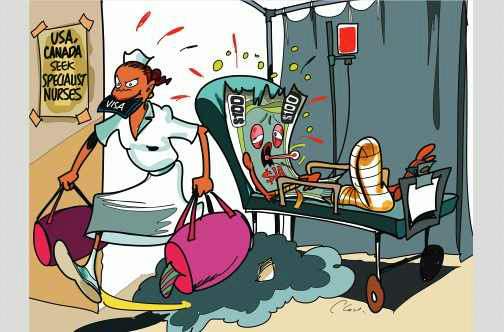
A local medical school official has charged that 85 per cent of Jamaica’s trained nurses migrate after completing their training and the situation has been made worse by the novel coronavirus pandemic.
Executive dean at Caribbean School of Medical Science, Jamaica (CSMSJ) Dr Neville Graham made the claim at the institution’s first graduation ceremony recently, as he charged that the world is in need of approximately 2.5 million doctors and 3.5 million nurses.
“The COVID-19 pandemic has worsened the situation. We note that many older professionals have retired. We note that many of our young professionals have migrated… 85 per cent of our nurses in Jamaica have migrated after they have done their final exams and internship… Jamaica is in short supply of all [health-care] professionals, especially nurses,” Graham declared.
“We now have to import professionals. It means then that our duty is also to recognise the problems that we face and to assist in helping to close the gap. Maybe it’s just a drop in the ocean at this time, but a start is a start,” he continued.
According to Graham, it was this decreasing number of health-care professionals in the island that led to the establishment of the CSMSJ. The medical school is a chartered institute of Jamaica as of June 30, 2017 and, given that it was officially established in 2014, Graham congratulated four students graduating with doctor of medicine degrees and nine others graduating with associate degrees in natural and applied science.
Meanwhile, president of the Nurses Association of Jamaica Patsy Edwards-Henry told the Jamaica Observer that, while she is unable to confirm the exact number of nurses leaving the island for better opportunities overseas, the numbers were nevertheless “high”.
“We do know that over the last three years or so over 1,500 nurses have migrated. COVID slowed it down a little bit, but it has now started going back up because you will understand that remuneration in Jamaica is not as attractive as in other places, so that’s number one. And number two, the Ministry of Health does not have a training budget in place to train nurses for the public health sector,” Edwards-Henry said as she urged the Government to implement a training budget for nurses to ensure they would be required to work for a period of time for the country.
“That does not happen, so the nursing students go to university, they pay their way [and] at the end of their training they do not have a guarantee of a job. They have their student loans to pay, so what they do, they go and seek employment at other places. Sometimes when they go and get the employment at the other places and by the time the Government call them, they realised that probably the little money that they [are] getting not working as a nurse is more beneficial than if they come and work as a nurse, so they’ll take on nursing as their side job.”
She explained that in addition to not having attractive salaries for local registered nurses, overseas recruiters seeking qualified nurses recruit top-performing students before they even complete their training.
“The recruiters look at the nursing students who are maintaining an average of 80 [per cent] and over…I do know that a large number of our brightest minds are not [staying] in Jamaica. So, the migration creates a challenge within itself,” Edwards-Henry said.
Speaking on the impact of the decreasing number of nurses on the country’s health sector, Edwards-Henry stated: “You go into a clinic and you have one nurse with 20 or 30 mothers to see and, although it seems impossible, nurses will sit down, she will listen to some people quarrelling, she’s going to calm them down, and she’s going to see all patients. If we had more nurses the wait wouldn’t be so long…I do believe that we would be able to have a more efficient health-care sector if we had the requisite number of nurses.”